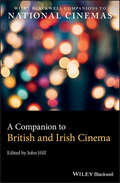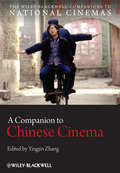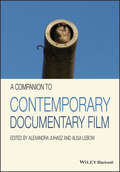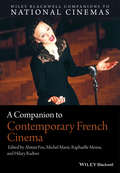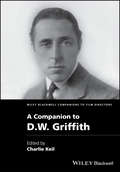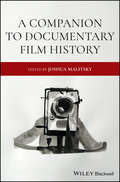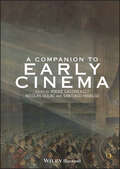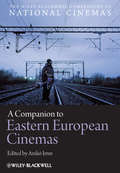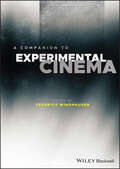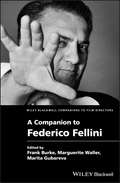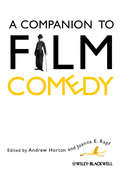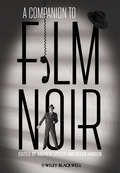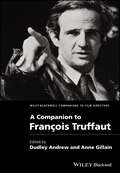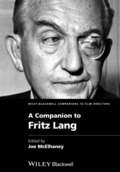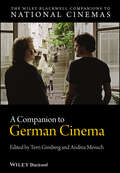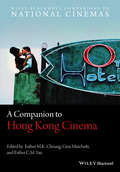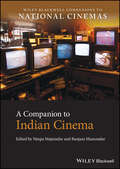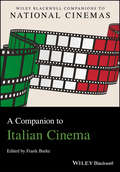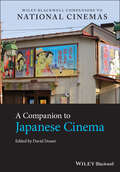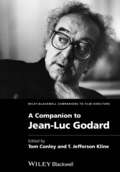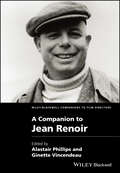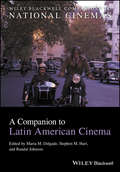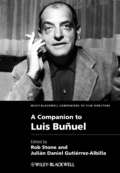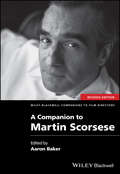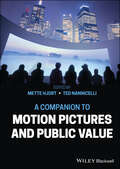- Table View
- List View
A Companion to British and Irish Cinema (Wiley Blackwell Companions to National Cinemas)
by John HillA stimulating overview of the intellectual arguments and critical debates involved in the study of British and Irish cinemas British and Irish film studies have expanded in scope and depth in recent years, prompting a growing number of critical debates on how these cinemas are analysed, contextualized, and understood. A Companion to British and Irish Cinema addresses arguments surrounding film historiography, methods of textual analysis, critical judgments, and the social and economic contexts that are central to the study of these cinemas. Twenty-nine essays from many of the most prominent writers in the field examine how British and Irish cinema have been discussed, the concepts and methods used to interpret and understand British and Irish films, and the defining issues and debates at the heart of British and Irish cinema studies. Offering a broad scope of commentary, the Companion explores historical, cultural and aesthetic questions that encompass over a century of British and Irish film studies—from the early years of the silent era to the present-day. Divided into five sections, the Companion discusses the social and cultural forces shaping British and Irish cinema during different periods, the contexts in which films are produced, distributed and exhibited, the genres and styles that have been adopted by British and Irish films, issues of representation and identity, and debates on concepts of national cinema at a time when ideas of what constitutes both ‘British’ and ‘Irish’ cinema are under question. A Companion to British and Irish Cinema is a valuable and timely resource for undergraduate and postgraduate students of film, media, and cultural studies, and for those seeking contemporary commentary on the cinemas of Britain and Ireland.
A Companion to Chinese Cinema (Wiley Blackwell Companions to National Cinemas #20)
by Yingjin ZhangA Companion to Chinese Cinema is a collection of original essays written by experts in a range of disciplines that provide a comprehensive overview of the evolution and current state of Chinese cinema. Represents the most comprehensive coverage of Chinese cinema to date Applies a multidisciplinary approach that maps the expanding field of Chinese cinema in bold and definitive ways Draws attention to previously neglected areas such as diasporic filmmaking, independent documentary, film styles and techniques, queer aesthetics, star studies, film and other arts or media Features several chapters that explore China’s new market economy, government policy, and industry practice, placing the intricate relationship between film and politics in a historical and international context Includes overviews of Chinese film studies in Chinese and English publications
A Companion to Contemporary Documentary Film
by Alexandra Juhasz Alisa LebowA Companion to Contemporary Documentary Film presents a collection of original essays that explore major issues surrounding the state of current documentary films and their capacity to inspire and effect change. Presents a comprehensive collection of essays relating to all aspects of contemporary documentary films Includes nearly 30 original essays by top documentary film scholars and makers, with each thematic grouping of essays sub-edited by major figures in the field Explores a variety of themes central to contemporary documentary filmmakers and the study of documentary film – the planet, migration, work, sex, virus, religion, war, torture, and surveillance Considers a wide diversity of documentary films that fall outside typical canons, including international and avant-garde documentaries presented in a variety of media
A Companion to Contemporary French Cinema (Wiley Blackwell Companions to National Cinemas)
by Alistair Fox Michel Marie Rapha Lle Moine Hilary RadnerA Companion to Contemporary French Cinema presents a comprehensive collection of original essays addressing all aspects of French cinema from 1990 to the present day. Features original contributions from top film scholars relating to all aspects of contemporary French cinema Includes new research on matters relating to the political economy of contemporary French cinema, developments in cinema policy, audience attendance, and the types, building, and renovation of theaters Utilizes groundbreaking research on cinema beyond the fiction film and the cinema-theater such as documentary, amateur, and digital filmmaking Contains an unusually large range of methodological approaches and perspectives, including those of genre, gender, auteur, industry, economic, star, postcolonial and psychoanalytic studies Includes essays by important French cinema scholars from France, the U.S., and New Zealand, many of whose work is here presented in English for the first time
A Companion to D. W. Griffith (Wiley Blackwell Companions to Film Directors)
by Charlie KeilThe most comprehensive volume on one of the most controversial directors in American film history A Companion to D.W. Griffith offers an exhaustive look at the first acknowledged auteur of the cinema and provides an authoritative account of the director’s life, work, and lasting filmic legacy. The text explores how Griffith’s style and status advanced along with cinema’s own development during the years when narrative became the dominant mode, when the short gave way to the feature, and when film became the pre-eminent form of mass entertainment. Griffith was at the centre of each of these changes: though a contested figure, he remains vital to any understanding of how cinema moved from nickelodeon fixture to a national pastime, playing a significant role in the cultural ethos of America. With the renewed interest in Griffith’s contributions to the film industry, A Companion to D.W. Griffith offers a scholarly look at a career that spanned more than 25 years. The editor, a leading scholar on D.W. Griffith, and the expert contributors collectively offer a unique account of one of the monumental figures in film studies. Presents the most authoritative, complete account of the director’s life, work, and lasting legacy Builds on the recent resurgence in the director’s scholarly and popular reputation Edited by a leading authority on D.W. Griffith, who has published extensively on this controversial director Offers the most up-to-date, singularly comprehensive volume on one of the monumental figures in film studies
A Companion to Documentary Film History
by Joshua MalitskyThis volume offers a new and expanded history of the documentary form across a range of times and contexts, featuring original essays by leading historians in the field In a contemporary media culture suffused with competing truth claims, documentary media have become one of the most significant means through which we think in depth about the past. The most rigorous collection of essays on nonfiction film and media history and historiography currently available, A Companion to Documentary Film History offers an in-depth, global examination of central historical issues and approaches in documentary, and of documentary's engagement with historical and contemporary topics, debates, and themes. The Companion's twenty original essays by prominent nonfiction film and media historians challenge prevalent conceptions of what documentary is and was, and explore its growth, development, and function over time. The authors provide fresh insights on the mode's reception, geographies, authorship, multimedia contexts, and movements, and address documentary's many aesthetic, industrial, historiographical, and social dimensions. This authoritative volume: Offers both historical specificity and conceptual flexibility in approaching nonfiction and documentary media Explores documentary's multiple, complex geographic and geopolitical frameworks Covers a diversity of national and historical contexts, including Revolution-era Soviet Union, post-World War Two Canada and Europe, and contemporary China Establishes new connections and interpretive contexts for key individual films and film movements, using new primary sources Interrogates established assumptions about documentary authorship, audiences, and documentary's historical connection to other media practices. A Companion to Documentary Film History is an ideal text for undergraduate and graduate courses covering documentary or nonfiction film and media, an excellent supplement for courses on national or regional media histories, and an important new resource for all film and media studies scholars, particularly those in nonfiction media.
A Companion to Early Cinema
by André Gaudreault Nicolas Dulac Santiago HidalgoAn authoritative and much-needed overview of the main issues in the field of early cinema from over 30 leading international scholars in the field First collection of its kind to offer in one reference: original theory, new research, and reviews of existing studies in the field Features over 30 original essays from some of the leading scholars in early cinema and Film Studies, including Tom Gunning, Jane Gaines, Richard Abel, Thomas Elsaesser, and André Gaudreault Caters to renewed interest in film studies' historical methods, with strict analysis of multiple and competing sources, providing a critical re-contextualization of films, printed material and technologies Covers a range of topics in early cinema, such as exhibition, promotion, industry, pre-cinema, and film criticism Broaches the latest research on the subject of archival practices, important particularly in the current digital context
A Companion to Eastern European Cinemas (Wiley Blackwell Companions to National Cinemas #2)
by Anikó ImreA Companion to Eastern European Cinemas showcases twenty-five essays written by established and emerging film scholars that trace the history of Eastern European cinemas and offer an up-to-date assessment of post-socialist film cultures. Showcases critical historical work and up-to-date assessments of post-socialist film cultures Features consideration of lesser known areas of study, such as Albanian and Baltic cinemas, popular genre films, cross-national distribution and aesthetics, animation and documentary Places the cinemas of the region in a European and global context Resists the Cold War classification of Eastern European cinemas as “other” art cinemas by reconnecting them with the main circulation of film studies Includes discussion of such films as Taxidermia, El Perro Negro, 12:08 East of Bucharest Big Tõll, and Breakfast on the Grass and explores the work of directors including Tamás Almási, Walerian Borowczyk, Roman Polanski, Jerzy Skolimowski, Andrzej ¯u³awski, and Karel Vachek amongst many others
A Companion to Experimental Cinema
by Federico WindhausenAn exploration of what experimental cinema was, is, and might become A Companion to Experimental Cinema is a collection of original essays organized around both theoretical and historical issues of concern to film scholars, programmers, filmmakers, and viewers. Newly-commissioned essays written by specialists in the field, along with dialogues conducted with a diverse range of practitioners, focus on core subjects to present an international array of overlapping and contrasting perspectives. This unique text not only provides detailed accounts of particular films and filmmakers, but also discusses new approaches of understanding, characterizing, and shaping experimental cinema. The Companion offers readers an accessible point of entry to the material while seeking to contribute to scholarly debates. Essays explore a wide range of topics within the realm of experimental film, including the shift from traditional biography to broader contexts, the increased attention afforded to local and transnational circuits of exchange, and the deepening of theoretical considerations regarding cultural identity and cinematic aesthetics. Key themes and concepts are inter-woven throughout the text, offering fresh perspectives on experimental cinema&’s dialogues with other modes and practices of film and video, its interactions with the non-cinematic arts, its responses to changing technological landscapes, and more. An essential addition to the field, the Companion: Balances introductory summaries and scholarly dialogue with existing literature Explores how the study of experimental cinema can benefit from scholarship in other disciplines Includes numerous analyses of films that are readily available to view via digital media Discusses both canonical and obscure or neglected works Examines the effects of the growing diversification of experimental film scholarship A Companion to Experimental Cinema is a valuable resource for scholars of film studies and art history, curators and programmers, critics and bloggers, filmmakers and artists, and anyone interested in exploring experimental or avant-garde cinema.
A Companion to Federico Fellini (Wiley Blackwell Companions to Film Directors)
by Frank Burke Marguerite Waller Marita GubarevaA groundbreaking academic treatment of Fellini, provides new, expansive, and diverse perspectives on his films and influence The Wiley Blackwell Companion to Federico Fellini presents new methodologies and fresh insights for encountering, appreciating, and contextualizing the director’s films in the 21st century. A milestone in Fellini scholarship, this volume provides contributions by leading scholars, intellectuals, and filmmakers, as well as insights from collaborators and associates of the Italian director. Scholarly yet readable essays explore the fundamental aspects of Fellini’s works while addressing their contemporary relevance in contexts ranging from politics and the environment to gender, race, and sexual orientation. As the centennial of Federico Fellini’s birth in approaches in 2020, this timely work provides new readings of Fellini’s films and illustrates Fellini’s importance as a filmmaker, artist,and major cultural figure. The text explores topics such as Fellini’s early cinematic experience, recurring themes and patterns in his films, his collaborations and influences, and his unique forms of cinematic expression. In a series of “Short Takes” sections, contributors look at specific films that have particular significance or personal relevance. Destined to become the standard research tool for Fellini studies, this volume: Offers new theoretical frameworks, encounters, critiques, and interpretations of Fellini’s work Discusses Fellini’s creativity outside of filmmaking, such as his graphic art and his Book of Dreams published after his death. Examines Fellini’s influence on artists not only in the English-speaking world but in places such as Turkey, Japan, South Asia, Russia, Cuba, North Africa. Demonstrates the interrelationship between Fellini’s work and visual art, literature, fashion, marketing, and many other dimensions of both popular and high culture. Features personal testimonies from family, friends and associates of Fellini such as Francesca Fabbri Fellini, Gianfranco Angelucci, Valeria Ciangottini, and Lina Wertmüller Includes an extensive appendix of freely accessible archival resources on Fellini’s work The Wiley Blackwell Companion to Federico Fellini is an indispensable resource for students, instructors, and scholars of Fellini, Italian cinema, cinema and art history, and all areas of film and media studies.
A Companion to Film Comedy
by Andrew Horton Joanna E. RapfA wide-ranging survey of the subject that celebrates the variety and complexity of film comedy from the ‘silent’ days to the present, this authoritative guide offers an international perspective on the popular genre that explores all facets of its formative social, cultural and political context A wide-ranging collection of 24 essays exploring film comedy from the silent era to the present International in scope, the collection embraces not just American cinema, including Native American and African American, but also comic films from Europe, the Middle East, and Korea Essays explore sub-genres, performers, and cultural perspectives such as gender, politics, and history in addition to individual works Engages with different strands of comedy including slapstick, romantic, satirical and ironic Features original entries from a diverse group of multidisciplinary international contributors
A Companion to Film Noir
by Andre Spicer Helen HansonAn authoritative companion that offers a wide-ranging thematic survey of this enduringly popular cultural form and includes scholarship from both established and emerging scholars as well as analysis of film noir's influence on other media including television and graphic novels. Covers a wealth of new approaches to film noir and neo-noir that explore issues ranging from conceptualization to cross-media influences Features chapters exploring the wider ‘noir mediascape’ of television, graphic novels and radio Reflects the historical and geographical reach of film noir, from the 1920s to the present and in a variety of national cinemas Includes contributions from both established and emerging scholars
A Companion to François Truffaut
by Dudley Andrew Anne GillainThe 34 essays of this collection by leading international scholars reassess Truffaut's impact on cinema as they locate the unique quality of his thematic obsessions and his remarkable narrative techniques. Almost 30 years after his death, we are presented with strikingly original perspectives on his background, influences, and importance. Bridges a gap in film scholarship with a series of 34 original essays by leading film scholars that assess the lasting impact of Truffaut's work Provides striking new readings of individual films, and new perspectives on Truffaut's background, influences, and importance Offers a wide choice of critical perspectives ranging from current reflections in film theories to articles applying methodologies that have recently been neglected or considered controversial Includes international viewpoints from a range of European countries, and from Japan, New Zealand, and Brazil Draws on Truffaut's archives at the BiFI (Bibliotheque du film) in Paris Includes an extended interview with French filmmaker Arnaud Desplechin concerning Truffaut's shifting stature in French film culture and his manner of thought and work as a director
A Companion to Fritz Lang (Wiley Blackwell Companions to Film Directors)
by Joe McElhaneyThis collection of critical essays offers an unrivalled and up-to-the-minute assessment of the prolific and resilient life and vision of one of cinema’s greatest auteurs. The first edited collection of essays on Fritz Lang’s body of work in over thirty years A comprehensive assessment of one of cinema’s most influential figures Brings together key scholars, including Tom Gunning and Chris Fujiwara, to share their latest insights Features translated contributions from writers rarely rendered in English such as Nicole Brenez and Paolo Berletto Offers multinational and multi-perspectival analysis of Lang’s oeuvre, including all his key films
A Companion to German Cinema (Wiley Blackwell Companions to National Cinemas #4)
by Terri Ginsberg Andrea MenschA Companion to German Cinema offers a wide-ranging collection of essays demonstrating state-of-play scholarship on German cinema at a time during which cinema studies as well as German cinema have once again begun to flourish. Offers a careful combination of theoretical rigor, conceptual accessibility, and intellectual inclusiveness Includes essays by well-known writers as well as up-and-coming scholars who take innovative critical approaches to both time-honored and emergent areas in the field, especially regarding race, gender, sexuality, and (trans)nationalism Distinctive for its contemporary relevance, reorienting the field to the global twenty-first century Fills critical gaps in the extant scholarship, opening the field onto new terrains of critical engagement
A Companion to Hong Kong Cinema (Wiley Blackwell Companions to National Cinemas)
by Esther M.K. Cheung Gina Marchetti Esther C.M. YauA Companion to Hong Kong Cinema provides the first comprehensive scholarly exploration of this unique global cinema. By embracing the interdisciplinary approach of contemporary film and cultural studies, this collection navigates theoretical debates while charting a new course for future research in Hong Kong film. Examines Hong Kong cinema within an interdisciplinary context, drawing connections between media, gender, and Asian studies, Asian regional studies, Chinese language and cultural studies, global studies, and critical theory Highlights the often contentious debates that shape current thinking about film as a medium and its possible future Investigates how changing research on gender, the body, and sexual orientation alter the ways in which we analyze sexual difference in Hong Kong cinema Charts how developments in theories of colonialism, postcolonialism, globalization, neoliberalism, Orientalism, and nationalism transform our understanding of the economics and politics of the Hong Kong film industry Explores how the concepts of diaspora, nostalgia, exile, and trauma offer opportunities to rethink accepted ways of understanding Hong Kong’s popular cinematic genres and stars
A Companion to Indian Cinema (Wiley Blackwell Companions to National Cinemas)
by Neepa Majumdar Ranjani MazumdarA new collection in the Wiley Blackwell Companions to National Cinemas series, featuring the cinemas of India In A Companion to Indian Cinema, film scholars Neepa Majumdar and Ranjani Mazumdar along with 25 established and emerging scholars, deliver new research on contemporary and historical questions on Indian cinema. The collection considers Indian cinema&’s widespread presence both within and outside the country, and pays particular attention to regional cinemas such as Bhojpuri, Bengali, Malayalam, Manipuri, and Marathi. The volume also reflects on the changing dimensions of technology, aesthetics, and the archival impulse of film. The editors have included scholarship that discusses a range of films and film experiences that include commercial cinema, art cinema, and non-fiction film. Even as scholarship on earlier decades of Indian cinema is challenged by the absence of documentation and films, the innovative archival and field work in this Companion extends from cinema in early twentieth century India to a historicized engagement with new technologies and contemporary cinematic practices. There is a focus on production cultures and circulation, material cultures, media aesthetics, censorship, stardom, non-fiction practices, new technologies, and the transnational networks relevant to Indian cinema. Suitable for undergraduate and graduate students of film and media studies, South Asian studies, and history, A Companion to Indian Cinema is also an important new resource for scholars with an interest in the context and theoretical framework for the study of India&’s moving image cultures.
A Companion to Italian Cinema
by Frank BurkeWritten by leading figures in the field, A Companion to Italian Cinema re-maps Italian cinema studies, employing new perspectives on traditional issues, and fresh theoretical approaches to the exciting history and field of Italian cinema. Offers new approaches to Italian cinema, whose importance in the post-war period was unrivalled Presents a theory based approach to historical and archival material Includes work by both established and more recent scholars, with new takes on traditional critical issues, and new theoretical approaches to the exciting history and field of Italian cinema Covers recent issues such as feminism, stardom, queer cinema, immigration and postcolonialism, self-reflexivity and postmodernism, popular genre cinema, and digitalization A comprehensive collection of essays addressing the prominent films, directors and cinematic forms of Italian cinema, which will become a standard resource for academic and non-academic purposes alike
A Companion to Japanese Cinema (Wiley Blackwell Companions to National Cinemas)
by David DesserGo beyond Kurosawa and discover an up-to-date and rigorous examination of historical and modern Japanese cinema In A Companion to Japanese Cinema, distinguished cinematic researcher David Desser delivers insightful new material on a fascinating subject, ranging from the introduction and exploration of under-appreciated directors, like Uchida Tomu and Yoshimura Kozaburo, to an appreciation of the Golden Age of Japanese cinema from the point of view of little-known stars and genres of the 1950s. This Companion includes new resources that deal in-depth with the issue of gender in Japanese cinema, including a sustained analysis of Kawase Naomi, arguably the most important female director in Japanese film history. Readers will appreciate the astute material on the connections and relationships that tie together Japanese television and cinema, with implications for understanding the modern state of Japanese film. The Companion concludes with a discussion of the Japanese media’s response to the 3/11 earthquake and tsunami that devastated the nation. The book also includes: A thorough introduction to the History, Ideology, and Aesthetics of Japanese cinema, including discussions of Kyoto as the cinematic center of Japan and the Pure Film Movement and modern Japanese film style An exploration of the background to the famous story of Taki no Shiraito and the significant and underappreciated contributions of directors Uchida Tomu, as well as Yoshimura Kozaburo A rigorous comparison of old and new Japanese cinema, including treatments of Ainu in documentary films and modernity in film exhibition Practical discussions of intermediality, including treatments of scriptwriting in the 1930s and the influence of film on Japanese television Perfect for upper-level undergraduate and graduate students studying Japanese and Asian cinema, A Companion to Japanese Cinema is a must-read reference for anyone seeking an insightful and contemporary discussion of modern scholarship in Japanese cinema in the 20th and 21st centuries.
A Companion to Jean-Luc Godard (Wiley Blackwell Companions to Film Directors #6)
by Tom Conley T. Jefferson KlineThis compendium of original essays offers invaluable insights into the life and works of one of the most important and influential directors in the history of cinema, exploring his major films, philosophy, politics, and connections to other critics and directors. Presents a compendium of original essays offering invaluable insights into the life and works of one of the most important and influential filmmakers in the history of cinema Features contributions from an international cast of major film theorists and critics Provides readers with both an in-depth reading of Godard’s major films and a sense of his evolution from the New Wave to his later political periods Brings fresh insights into the great director’s biography, including reflections on his personal philosophy, politics, and connections to other critics and filmmakers Explores many of the 80 features Godard made in nearly 60 years, and includes coverage of his recent work in video
A Companion to Jean Renoir
by Ginette Vincendeau Alastair PhillipsFrançois Truffaut called him, simply, 'the best'. Jean Renoir is a towering figure in world cinema and fully justifies this monumental survey that includes contributions from leading international film scholars and comprehensively analyzes Renoir's life and career from numerous critical perspectives.New and original research by the world's leading English and French language Renoir scholars explores stylistic, cultural and ideological aspects of Renoir's films as well as key biographical periodsThematic structure admits a range of critical methodologies, from textual analysis to archival research, cultural studies, gender-based and philosophical approachesFeatures detailed analysis of Renoir's essential worksProvides an international perspective on this key auteur's enduring significance in world film history
A Companion to Latin American Cinema (Wiley Blackwell Companions to National Cinemas)
by Maria M. Delgado Stephen M. Hart Randal JohnsonA Companion to Latin American Cinema offers a wide-ranging collection of newly commissioned essays and interviews that explore the ways in which Latin American cinema has established itself on the international film scene in the twenty-first century. Features contributions from international critics, historians, and scholars, along with interviews with acclaimed Latin American film directors Includes essays on the Latin American film industry, as well as the interactions between TV and documentary production with feature film culture Covers several up-and-coming regions of film activity such as nations in Central America Offers novel insights into Latin American cinema based on new methodologies, such as the quantitative approach, and essays contributed by practitioners as well as theorists
A Companion to Luis Buñuel
by Rob StoneA Companion to Luis Buñuel presents a collection of critical readings by many of the foremost film scholars that examines and reassesses myriad facets of world-renowned filmmaker Luis Buñuel's life, works, and cinematic themes. A collection of critical readings that examine and reassess the controversial filmmaker's life, works, and cinematic themes Features readings from several of the most highly-regarded experts on the cinema of Buñuel Includes a multidisciplinary range of approaches from experts in film studies, Hispanic studies, Surrealism, and theoretical concepts such as those of Gilles Deleuze Presents a previously unpublished interview with Luis Buñuel's son, Juan Luis Buñuel
A Companion to Martin Scorsese (Wiley Blackwell Companions to Film Directors)
by Aaron BakerA Companion to Martin Scorsese is a comprehensive collection of original essays assessing the career of one of America’s most prominent contemporary filmmakers. Contains contributions from prominent scholars in North America and Europe that use a variety of analytic approaches Offers fresh interpretations of some of Scorsese’s most influential films, including Mean Streets, Taxi Driver, Raging Bull, Goodfellas, Gangs of New York, and Hugo Considers Scorsese's place within the history of American and world cinema; his work in relation to auteur theory; the use of popular music and various themes such as violence, ethnicity, religion, sexuality, gender, and race in his films, and more
A Companion to Motion Pictures and Public Value
by Mette Hjort Ted NannicelliA singular collection of original essays exploring the varied intersections of motion pictures and public value A Companion to Motion Pictures and Public Value presents a cross-disciplinary investigation of the past, present, and possible future contributions of the moving image to the public good. This unique volume explores the direct and indirect public value developed through motion pictures of different types, genres, and screening sites. Essays by world-renowned scholars from diverse disciplines present original conceptual work, philosophical arguments, historical discussion, empirical research, and specific case studies. Divided into seven thematically organized sections, the Companion identifies the various kinds of values that motion pictures can deliver, amongst them artistic, ethical, environmental, cultural, political, cognitive, and spiritual value. Each section includes an introduction in which the editors outline main themes and highlight connections between individual chapters. Throughout the text, probing essays interrogate the issue of public value as it relates to the cinema and provide insight into how motion pictures play a positive role in human life and society. Featuring original research essays on a pioneering topic, this innovative reference text: Brings together work by expert authors in disciplines such as Philosophy, Political Science, Cultural Studies, Film Studies, Sociology, and Environmental Studies Discusses a variety of institutional landscapes, policy formations, and types and styles of filmmaking Provides wide and inclusive coverage of cinema’s relation to public value in Africa, Asia, China, Europe, the Middle East, and the Americas Explores the role of motion pictures in community formation, nation building, and the construction of good societies Covers new and emerging topics such as cinema-based fields focused on health and wellbeingA Companion to Motion Pictures and Public Value is an ideal textbook for advanced undergraduate and graduate courses in Film, Media, and Cultural Studies, and is a valuable resource for scholars across a variety of disciplines
